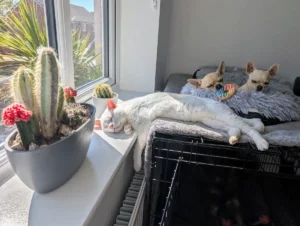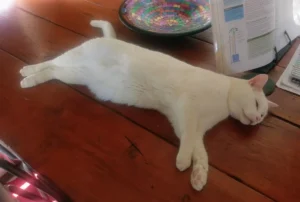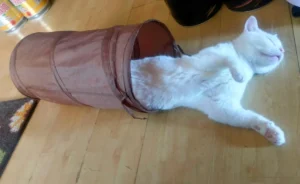
Cats have the uncanny ability to confuse sleep and something much more disturbing. They seem to be so good at relaxing that sometimes they really appear as if they are in another world altogether. In feline circles, this dramatic style of repose is affectionately referred to as ‘death sleep’. However, no other cat has perfected this enigmatic skill quite as completely as my cherished feline companion named Clutch.
Clutch is a master relaxer who has challenged my sanity and emotional well-being with his extreme sleeping positions and nonchalantness throughout time. But before you panic, let me put your mind at rest; Clutch is still very much alive. Nevertheless, his dedication to imitating a lifeless state is nothing short of epic.
Clutch’s Origin
It all started in 2015 when I saw Clutch for the first time—a long-legged, half-neglected rescue that stole my heart immediately. He had an insatiable appetite for both food and love right from the start. This ravenous curiosity led him to steal a slice of brie from my plate when I was not looking. Initially, he seemed only sheepish and slightly uncomfortable; however, that night would prove to be the start of something which has since entertained and plagued me.
I woke up suddenly to find Clutch sprawled lifeless on the pillow beside me. At first, it meant nothing and so I nudged him gently while whispering his name as I waited for a response. Nothing happened. My mind raced:
“Could he really be dead? Did that one slice do him in?”
With adrenaline coursing through my body, I turned on the lights quickly and gathered him into my arms tenderly. Just as despair overwhelmed me, Clutch casually opened his eyes and offered a loving “Prrrp?” At this point, my face was being rubbed against by its fuzzy head with clear delight at such late-night disruptions. Relief swamped over me alongside confusion at the same time.

I couldn’t sleep throughout the night worrying. I made up my mind to keep a close eye on Clutch’s body as he breathed rhythmically, promising myself never again.
Explanation of Deep Sleep Phenomenon
Clutch’s way of sleeping both fascinated and scared me. There are unique patterns of sleep among cats where they can rest up to 18 hours daily. They often relax their muscles completely in a deep-sleep phase named Rapid Eye Movement (REM). This state of complete relaxation accounts for their seemingly impossible positions and lifelessness.
However, Clutch took it to the next level. He would not respond to calls, gentle shaking or even moving him around with his commitment reaching a dramatic pitch. These episodes became more frequent and intense at once perpetuating my anxiety and amusement.
Health Checkups and Medical Drama
With Clutch’s tendency towards dramatic “death naps,” worries about possible underlying health issues were unavoidable. In order to diagnose his actual medical condition, I arranged for thorough veterinarian examinations.
A series of medical evaluations had been performed on Clutch after several neurological events that occurred some years back among other things including blood tests, CT scans, spinal fluid analysis and consultations with feline neurologists. Each test confirmed that he was really healthy but had some odd sleep quirks though they shouldn’t worry me too much in every case.
Once it briefly occurred to me that Clutch might be deaf. His insouciant demeanor and failure to react to sounds seemed to support this theory. However, comprehensive auditory testing promptly invalidated this proposition. Clutch’s hearing was perfect; he just preferred when and how he would respond—or rather not—to external stimuli.
Clutch’s Mastery of “Death Sleep”
Over the years, these episodes of “death sleep” have provided moments of pure terror followed immediately by laughter and relief. I have often referred to these dramatic fits as his personal act of defying the overly attentive nature of being a pet parent.
As they kept on occurring, my initial panic gradually gave way to a somewhat jaded amusement. Each episode was much the same:
Shock and disbelief at finding Clutch in what looks like lifelessness.
Frantic attempts at waking him up with no success whatsoever.
My heart pounds as I prepare myself for tragedy.
Lastly, there is a casual, indifferent awakening usually accompanied by an affectionate chirp and head rub begging for attention.

This routine has developed into an odd yet endearing aspect of our relationship. Clutch, insensitive to the alarm he inspires in us, remains the epitome of feline coolness.
Understanding Your Cat’s Sleep Habits
It must be remembered that extreme relaxation and weird sleeping positions are just normal cat behaviors. Their skeletal structure gives them an incredible flexibility that allows them to assume unusual postures that often look painful.
Moreover, considerable unresponsiveness may necessitate veterinary examination. Neurological disorders, inner ear problems, and some metabolic conditions can present similarly. So if your feline is consistently engaged in deep unresponsive behavior, medical advice would be good.
Feline Longevity: Clutch’s Ambitions
Although these episodes shockingly remind us of inevitable death in future, Clutch himself doesn’t seem worried about such kind of existential thinking at all. In fact, he tells me with his usual disdain that he wants to break the world’s longevity record for cats. This bold statement eases my fears – at least for the moment.
However unsettling it may be to eventually contemplate a concrete occurrence someday, I find reassurance in Clutch’s serene and unruffled attitude towards everything. For now, I cherish every eccentric, heart-stopping instance; knowing well the happiness—and occasional fear—of living with a cat who is a master at “death sleep.”
Cats teach us many lessons: patience, humor, and perhaps most profoundly how to embrace and even celebrate life’s quirks. While he sometimes threatens my sanity with his dramatic sleep performances, Clutch remains the ultimate champion of relaxation and my ever-endearing companion.

